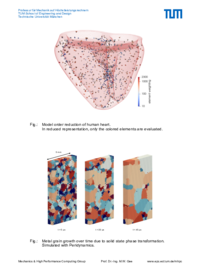Parallel Multi-Physics Simulations in Mechanical and Medical Engineering
- Institut
- Professur für Mechanik auf Höchstleistungsrechnern
- Typ
- Bachelorarbeit Semesterarbeit Masterarbeit
- Inhalt
- theoretisch
- Beschreibung
The Mechanics & High Performance Computing Group (MHPC, Professur für Mechanik auf Höchstleistungsrechnern) offers research topics for Bachelor's Theses, Master's Theses and term papers. Interest in development or application of numerical algorithms for a broad spectrum of mechanical problems is required. All topics for student projects are related to current research in our group; software implementation of developed ideas is typically included in the projects.
Our group aims at the development of efficient parallel methods in multi-physics and application to problems in science, engineering, and medicine. For this purpose, the group works on several software projects with real-life-application in mind. Some of our current projects are:
- Conventional methods such as the finite element method (FEM) for solid mechanics and fluid dynamics face natural restrictions at sharp edges and when cracks and very large deformations occur. Particle methods such as Peridynamics (PD) and related approaches are meshfree methods and do not have such limitations. One prime application is Additive Manufacturing (Selective Laser Melting).
- Topology optimization is a numerical optimization technique, with its main application in structural optimization. Within a given design space, material is distributed, such that the structure’s performance is maximized. At MHPC, we develop an efficient optimization framework for nonlinear topology optimization of complex mechanical problems.
- One project aims to develop experiment augmented models for the biomechanical simulation of atherosclerosis progression in aortic arches. We attempt to quantitatively reproduce, better understand, and ultimately predict the emergent behavior that is atherosclerotic plaque evolution. Currently we are working on a fully coupled model with in vivo measurements of the blood flow in a murine aortic arch, thereby yielding experiment-optimized predictions.
- We also develop techniques for computational efficiency of large-scale biomedical simulations including low-dimensional solution subspaces in combination with projection-based model reduction and hyper reduction for fast evaluation of nonlinear model contributions. As an example, cardiac mechanic simulations contain numerous patient-specific parameters, like material properties. Some of them need to be estimated by running multiple costly simulations and comparing the results with real-life data. Projection-based Reduced Order Modeling tries to “learn” from previous information to decrease the computational demand.
- Using inverse analysis combined with complex biological models we aim to predict cardiac heart growth in a patient specific setting. The predicted evolution of the heart can serve as additional information to the treating physician in case of a patient’s heart defect or cardiac abnormalities.
- To efficiently handle and process patient data, we work on the optimization and enhancement of semi-automatic heart segmentation. Generating three dimensional heart geometries from MRI or CT scans formulates the basis for many above mentioned applications like the simulation of a heartbeat.
For an extensive overview on our current research projects, please visit our website:
https://www.epc.ed.tum.de/mhpc/research/
If you are interested in working on a student’s project at the Mechanics & High Performance Computing Group, feel free to contact us via thesis.mhpced.tum.de, such that we can find a suitable topic that matches your interests. Please provide information on the type of project, your academic background, and your research interests. Also please attach a short CV and a recent status report from TUMOnline to your application. For security reasons, send pdf files only.
- Voraussetzungen
You ..
- are interested in numerical mechanics and computational methods
- enjoy programming (e.g. MATLAB, Pyhton, C++)
- are an enthusiastic problem sovler
- Möglicher Beginn
- sofort
- Kontakt
-
Mikhail Zverlov
Raum: GHB BC2 3.2.23
Tel.: 089 289 10363
mikhail.zverlovtum.de - Ausschreibung
-
